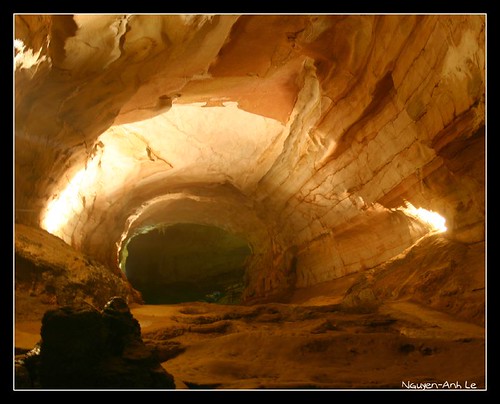 MapEmbed SkyDoorMobile versionFacebook pageFeedback
MapEmbed SkyDoorMobile versionFacebook pageFeedbackPhotos Phong Nha Cave
Child Places
 Tien Son Cave Tien Son Cave |
Information Phong Nha Cave

Formed approximately 250 million years ago, give or take a few million years, Phong Nha Cave is the largest and most beautiful cave in Vietnam. Located in the village of Son Trach, 55km northwest of Dong Hoi, it was designated a Unesco World Heritage site in 2000.
It's remarkable for its thousands of metres of underground passageways and river caves filled with abundant stalactites and stalagmites. In November and December the river is prone to flooding and the underground cave may be closed.
In 1990, a British caving expedition explored 35km of the cave and made the first reliable map of Phong Nha's underground (and underwater) passageways. They discovered that the main cavern is nearly 8km long, with 14 other caves nearby.
Phong Nha means ‘Cave of Teeth’, but, unfortunately, the ‘teeth’ (or stalagmites) that were by the entrance are no longer there. Once you get further into the cave, it's mostly unspoiled. There's also a dry cave in the mountainside just above Phong Nha Cave. You can walk to it from the entrance to Phong Nha Cave (10 minutes) - look for the sign to Tien Son at the foot of the stairs.
The Chams used the cave's grottoes as Hindu sanctuaries in the 9th and 10th centuries; the remains of their altars and inscriptions are still here. Vietnamese Buddhists continue to venerate these sanctuaries, as they do other Cham religious sites.
More recently, this cave was used as a hospital and ammunition depot during the American War. The entrance shows evidence of aerial attacks. That US war-planes spent considerable time bombing and strafing the Phong Nha area is really hardly surprising: this was one of the key entrance points to the Ho Chi Minh Trail. Some overgrown remains of the trail are still visible, though you'll need a guide to point them out to you.
You should he aware that Phong Nha is heavily visited by Vietnamese groups. The cave itself is fantastic, the experience less so. That is unless you like your World Heritage sites to incorporate litter, noise, people climbing on stalagmites and cigarette smoke in the underground caverns Of course these things are prohibited, but enforcement appears to be lax to say the least. Presumably these distractions can be avoided if you arrive early in the morning. The toilets might be less putrid then, too.
The Phong Nha Reception Department, an enormous complex in Son Trach village, organises tourist access to the cave. You buy your admission ticket here and organise a boat to take you to the cave. Boats seal about 10, so it's cheaper to share. The cave system is electrically lit, but you may want to bring a torch (flashlight), as some of the paths are poorly illuminated.
Source: www.waytovietnam.com
Other resouces
| Post to FacebookPost to Twitter | Embed this place into your site |
Entries Phong Nha Cave
View all entries...Tour Phong Nha Cave
Vietnam Great Biking Tours(12 days)
Vietnam Tour From North To South
View all tours...Related Places
 Phong Nha Cave Phong Nha Cave |